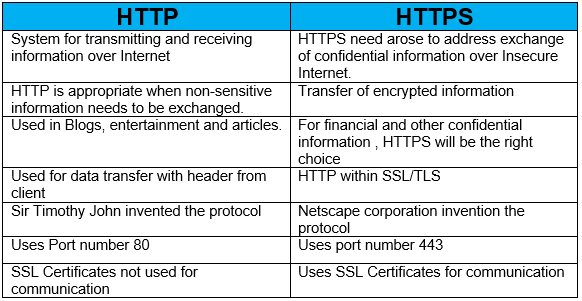Http Vs Https What Are The Key Differences Webopedia

Http Vs Https What Are The Key Differences Webopedia Http is an application layer protocol for transmitting hypermedia documents, such as html. it was designed for communication between web browsers and web servers, but it can also be used for other purposes, such as machine to machine communication, programmatic access to apis, and more. Http is an application layer protocol designed within the framework of the internet protocol suite. its definition presumes an underlying and reliable transport layer protocol. [20] the standard choice of the underlying protocol prior to http 3 is transmission control protocol (tcp).

Http Vs Https What Are The Key Differences Webopedia Http is a protocol for fetching resources such as html documents. it is the foundation of any data exchange on the web and it is a client server protocol, which means requests are initiated by the recipient, usually the web browser. What is 'http explained'? discover how to master http explained, with free examples and code snippets. Search the world's information, including webpages, images, videos and more. google has many special features to help you find exactly what you're looking for. Http messages are the mechanism used to exchange data between a server and a client in the http protocol. there are two types of messages: requests sent by the client to trigger an action on the server, and responses, the answer that the server sends in response to a request.

Http Vs Https What S The Difference Monsterhost Search the world's information, including webpages, images, videos and more. google has many special features to help you find exactly what you're looking for. Http messages are the mechanism used to exchange data between a server and a client in the http protocol. there are two types of messages: requests sent by the client to trigger an action on the server, and responses, the answer that the server sends in response to a request. Http response status codes indicate whether a specific http request has been successfully completed. responses are grouped in five classes: the status codes listed below are defined by rfc 9110. note: if you receive a response that is not listed here, it is a non standard response, possibly custom to the server's software. Http (hypertext transfer protocol) is a set of rules that govern how information will be transferred between networked devices, specifically web servers and client browsers. Http headers let the client and the server pass additional information with a message in a request or response. in http 1.x, a header is a case insensitive name followed by a colon, then optional whitespace which will be ignored, and finally by its value (for example: allow: post). Communication between client computers and web servers is done by sending http requests and receiving http responses. the world wide web is about communication between web clients and web servers. clients are often browsers (chrome, edge, safari), but they can be any type of program or device. servers are most often computers in the cloud.

Http Vs Https Everything You Need To Know Ip With Ease Http response status codes indicate whether a specific http request has been successfully completed. responses are grouped in five classes: the status codes listed below are defined by rfc 9110. note: if you receive a response that is not listed here, it is a non standard response, possibly custom to the server's software. Http (hypertext transfer protocol) is a set of rules that govern how information will be transferred between networked devices, specifically web servers and client browsers. Http headers let the client and the server pass additional information with a message in a request or response. in http 1.x, a header is a case insensitive name followed by a colon, then optional whitespace which will be ignored, and finally by its value (for example: allow: post). Communication between client computers and web servers is done by sending http requests and receiving http responses. the world wide web is about communication between web clients and web servers. clients are often browsers (chrome, edge, safari), but they can be any type of program or device. servers are most often computers in the cloud.
Comments are closed.